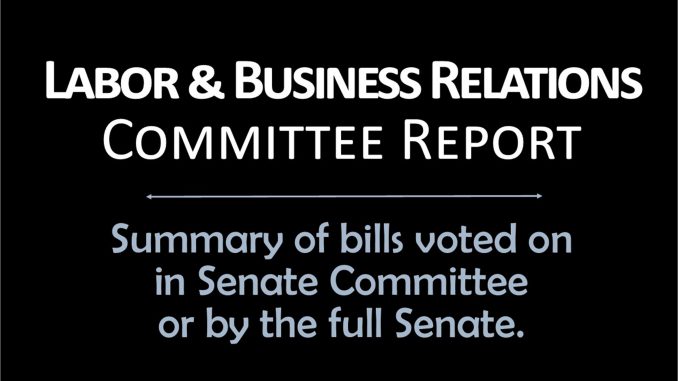
On this page
COMMITTEE ACTION:
SF 2114—Professional Licensees
SF 2114 requires that a professional or occupational license, certificate or registration be issued to a person without an examination if:
- That person establishes residency in Iowa; or
- That person is married to an active-duty member of the military and is accompanying the member on an official permanent change of station to a military installation in Iowa.
The person will receive the license, certification or registration if all these conditions are met:
- That person is currently licensed, certified or registered in at least one other state in the occupation or profession applied for or registration is in good standing in all states where they hold that license.
- That person has been licensed, certified or registered in another state for at least one year.
- When that person became licensed in another state, the other state imposed minimum initial education requirements and, if applicable, work experience. The other state must verify that the person met requirements.
- The person has previously passed an examination required by the other state.
- Their license has not been revoked or voluntarily surrendered or under investigation for unprofessional conduct.
- The person has not had discipline imposed by another regulating entity.
- The person does not have a complaint, allegation or investigation pending before any regulation entity in another state or country relating to unprofessional conduct.
- The person still pays all applicable fees.
- The person does not have a criminal history that would prevent them from holding the license in Iowa.
An amendment was adopted in committee, which states that a
person will be considered to have met the requirements of getting an Iowa
license, certification or registration if the other state does not impose
initial education requirements but the person has three or more years of
related work experience. In addition, as amended, the bill narrows the ability
of licensing and professional boards to disqualify individuals holding certain
licenses because of a criminal conviction. The amendment added language that
requires a licensing board to waive the application fee if the applicant
household income does not exceed 200 percent of the federal poverty level and
the person has not previously applied for the same license in Iowa.
[2/19: 7-4 (No: Democrats)]
SF 2294/SSB 3024—Unemployment Insurance Nonprofit Appeals
SF
2294 treats reimbursable nonprofit employers the same as contributory
employers for contesting their unemployment insurance reimbursement
(unemployment insurance tax rate for contributory employers). Currently, the
Code states when a nonprofit gets notice of the decision and how they have to
pay. To contest it, they must go to district court. The bill changes that to an
unemployment insurance administrative law judge.
[2/17: short form]
SF 2295/SSB 3028—Notice of Unemployment Insurance Claim
SF
2295 strikes language proving that notifications to interested parties for
an unemployment benefits claims be made by ordinary mail. The interested
parties will now have to select a format specified by the department (which
could be electronic or ordinary mail).
[2/17: short form]
SF 2304/SSB 3025—Landscaping Industry Unemployment Tax Rate
SF
2304 adds landscaping employers to the construction unemployment tax rate.
This is the highest rate in the tax table. This bill change will increase
contributions to the Unemployment Trust Fund by approximately $683,000
annually.
[2/17: short form]
SF 2305/SSB 3167—Voluntary Shared Work Program
SF
2305 makes changes to the Voluntary Shared Work Program for unemployment
insurance. The program is designed for businesses that experience downturns and
anticipate a layoff of at least 10% of their workforce. This program allows a
business to keep its employees, lower the hours of the employees instead of
eliminating jobs. The bill provides that a reduction in hours and corresponding
reduction in wages must be applied to equally all employees in the affected
unit for each week reported
(italicize = new code language). The bill states that an employer may file an
appeal in writing within 30 days from the date of the decision. These
provisions apply to all voluntary shared work plans approved by Iowa Workforce
Development on or after the effective date of the bill.
[2/17: short form]
SF 2306/SSB 3027—Injunction Upon Nonpayment
SF
2306 adds clarifying language to the injunctions regarding unemployment
insurance. When businesses fail to provide reports and records to Iowa
Workforce Development, they can cause workers to be ineligible for unemployment
due to the lack of wages. Also, the bill modifies a reference to plans for
liquidation of deficiencies.
[2/17: short form]
SSB 3026—Reduction in Benefits in Business Closing Layoffs
SSB
3026 reduces the number of weeks and unemployment benefits to those who
lose their jobs because of a business closure. Current law allows for a
different wage credit calculation and benefit duration for those individuals
who have been laid off due to the employer going out of business. This is a
different calculation and duration from a regular unemployment claim. For a
typical claim, 1/3 of the claimant’s wage credits are used to calculate the
maximum benefit amount, and the maximum amount of benefits is for 26 weeks.
Under current law for a business closing claim, the individual would receive ½
of the wage credits for 39 weeks. The bill strikes the different wage
calculation and benefit duration for a business closing. These individuals will
be treated like other claims.
[2/19: 7-4 (No: Democrats)]
SSB 3023—Prohibiting Noncompete Agreements
SSB
3023 prohibits an employer from requiring a low-wage employee to enter into
a noncompete agreement. “Low-wage employee” means an employee who earns an
hourly wage that is less than or equal to 200% of the federal minimum wage.
“Noncompete agreement” means an agreement between an employer and a low-wage
employee that restricts the low-wage employee from performing work for a
different employer for a specified period of time or work in a specified
geographical area or work for a different employer that is similar to the
low-wage employee’s work for the employer who is a party to the agreement.
[2/19: short form]
